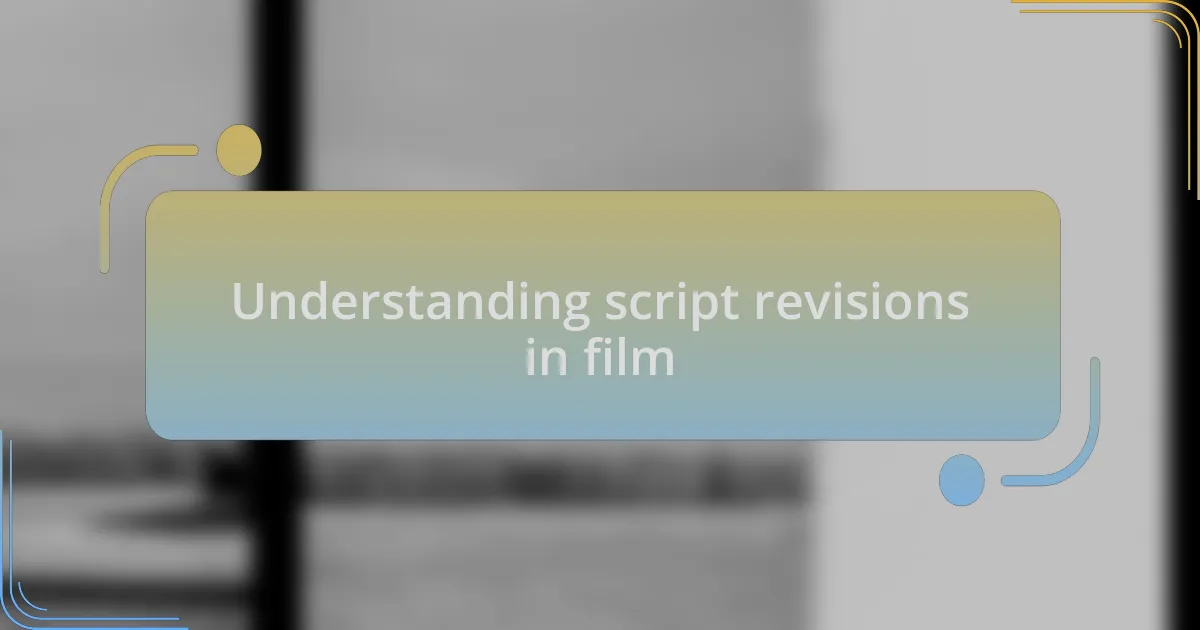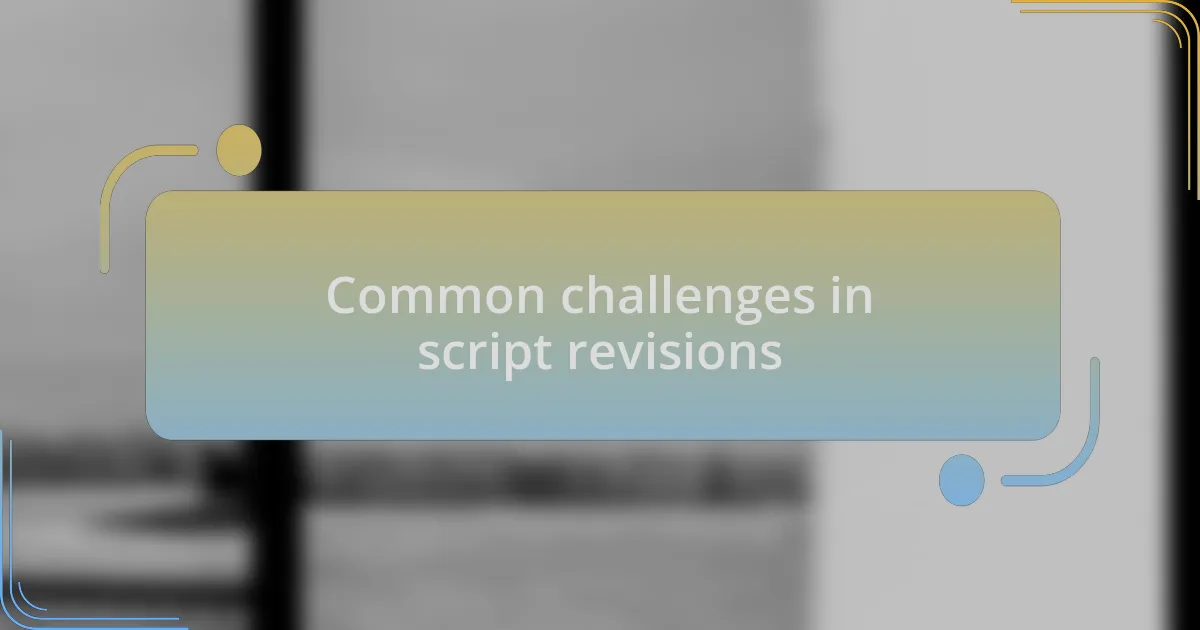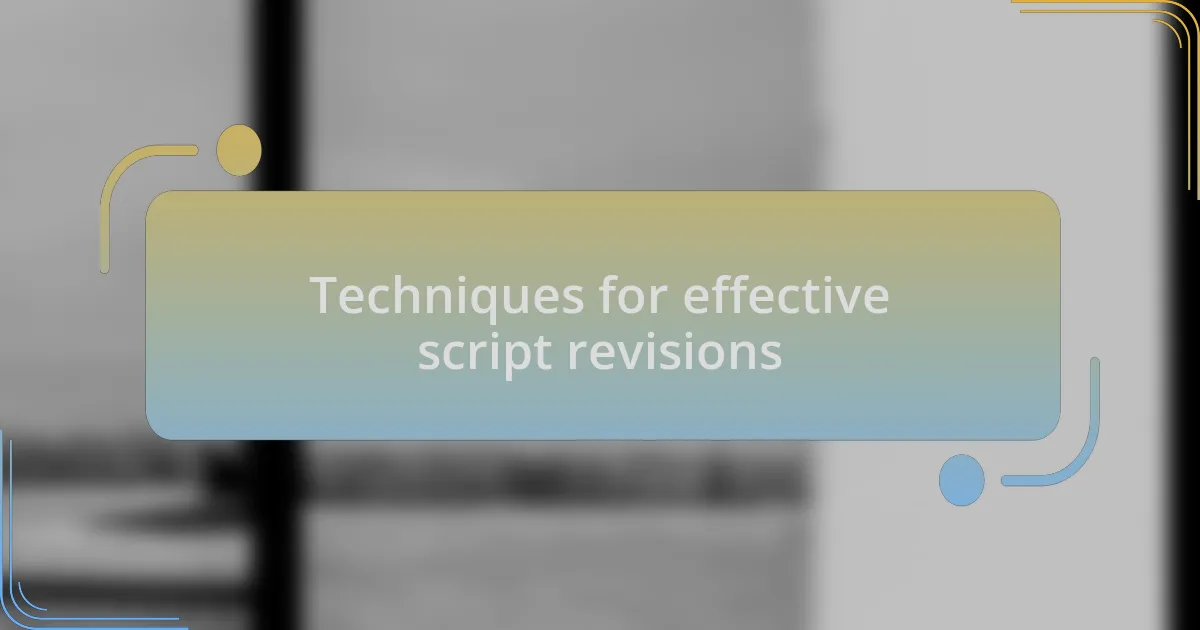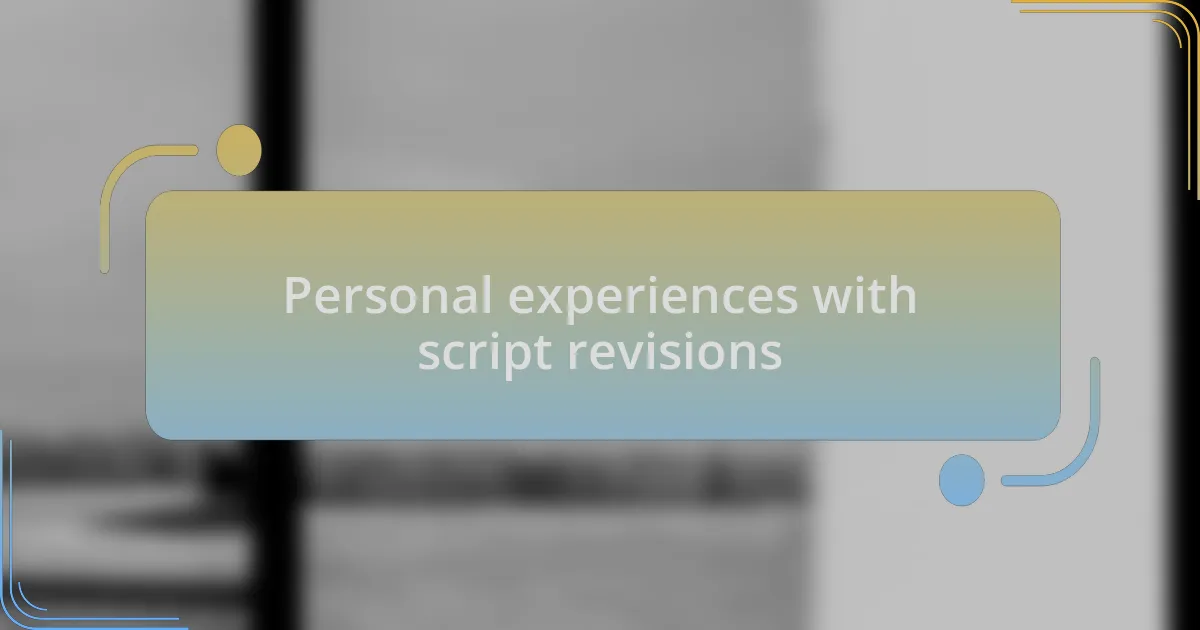Key takeaways:
- Script revisions are essential for enhancing emotional depth and fostering collaboration between writers and directors.
- Challenges in revisions include balancing creative instincts with clarity, emotional attachment to characters, and time constraints.
- Effective techniques for revisions involve structured feedback, reading scripts aloud for rhythm, and taking breaks to gain fresh perspectives.
- Letting go of beloved scenes can lead to better pacing, and collaboration can uncover deeper emotional resonance in scripts.

Understanding script revisions in film
Script revisions are a critical component of the filmmaking process, often shaping the entire narrative. I recall one project where a single revision turned a flat character into someone truly relatable and engaging. It’s fascinating to think about how subtle changes in dialogue or character progression can drastically enhance the emotional depth of a story.
When I first started in film production, I underestimated the impact of script revisions, believing the initial draft was nearly final. However, I learned that every feedback session revealed new perspectives, helping me see the story through different eyes. Have you ever looked at a script after a revision and felt like you were seeing it for the first time? It’s an enlightening experience.
Moreover, revisions serve as a bridge between the writer’s vision and the director’s interpretation. During one of my projects, I saw how collaborative efforts during script revisions uncovered threads in the story that I hadn’t noticed initially. This collaboration not only strengthens the narrative but also fosters a deeper connection among the team, reminding us all that great storytelling is often a team effort.

Common challenges in script revisions
Revisions bring a multitude of challenges, especially when balancing creative instincts against the need for clarity. I remember one instance where a well-meaning suggestion led to a convoluted subplot that detracted from the main storyline. It made me realize how crucial it is to sift through feedback carefully, prioritizing what enhances the story rather than complicates it. Have you ever faced a similar situation where external input muddled your vision?
Another common hurdle is the emotional turbulence that comes with altering beloved characters or scenes. During a particularly challenging rewrite, I found myself torn between maintaining a character’s original charm and addressing valid critique. It felt like losing a friend, which is ironic since my goal was to strengthen the story. How do you reconcile the attachment to your work with the necessity of change?
Time constraints can also be a relentless adversary in the revision process. I’ve been in situations where tight deadlines meant hurried discussions that led to hurried changes. This experience taught me the importance of prioritizing revisions—sometimes, it’s about making impactful adjustments rather than attempting to perfect every detail. Do you ever feel the pressure of time overshadowing the quality of your revisions?

Techniques for effective script revisions
One technique I’ve found invaluable is embracing feedback through a structured approach. During a recent rewrite, I created a feedback matrix that allowed me to categorize suggestions based on their impact on the narrative. This not only kept me focused but also transformed overwhelming feedback into manageable pieces. Have you ever felt swamped by too many opinions? This method can turn chaos into clarity.
I also practice reading my script aloud during revisions. On one occasion, I discovered that a heartfelt scene I thought was perfect sounded flat when spoken. This method reveals the rhythm and flow of dialogue, helping to identify awkward phrasing or emotional missteps. Have you ever imagined a scene soaring in your mind only to uncover its flaws in practice?
Lastly, I find that taking breaks between revisions fosters a fresh perspective. After stepping away for a day or two, I often return with new insights that guide significant changes. I remember revisiting a script after a weekend, and a glaring inconsistency jumped out at me that I had previously overlooked. How often do you give yourself that critical distance to see your work anew?

Personal experiences with script revisions
During my journey with script revisions, I’ve learned that letting go of attachment to certain scenes can be one of the toughest yet most rewarding experiences. I once had a beloved character arc that seemed essential, but after multiple rounds of feedback, it became clear that it slowed down the overall pacing. I remember the initial sting of deleting pages I had poured my heart into. Have you ever wrestled with saying goodbye to something you truly loved for the sake of improvement?
Another time, I experimented with collaborative revisions, inviting fellow writers into the process. The discussions we had were eye-opening. One friend’s perspective on a scene I thought was strong cracked open a door to deeper emotional resonance that I hadn’t considered. Have you ever felt that electric moment when a simple suggestion ignites a new creative spark?
I also find value in revisiting old drafts with fresh eyes a few months later. A script I set aside for a while suddenly sprang to life with new potential upon revisitation. I discovered a subplot that had gone stale in my mindset. It taught me that time can bring clarity and rejuvenation. How often do you revisit your work after some time away? The insights gained can be like discovering hidden treasures in your own creation.